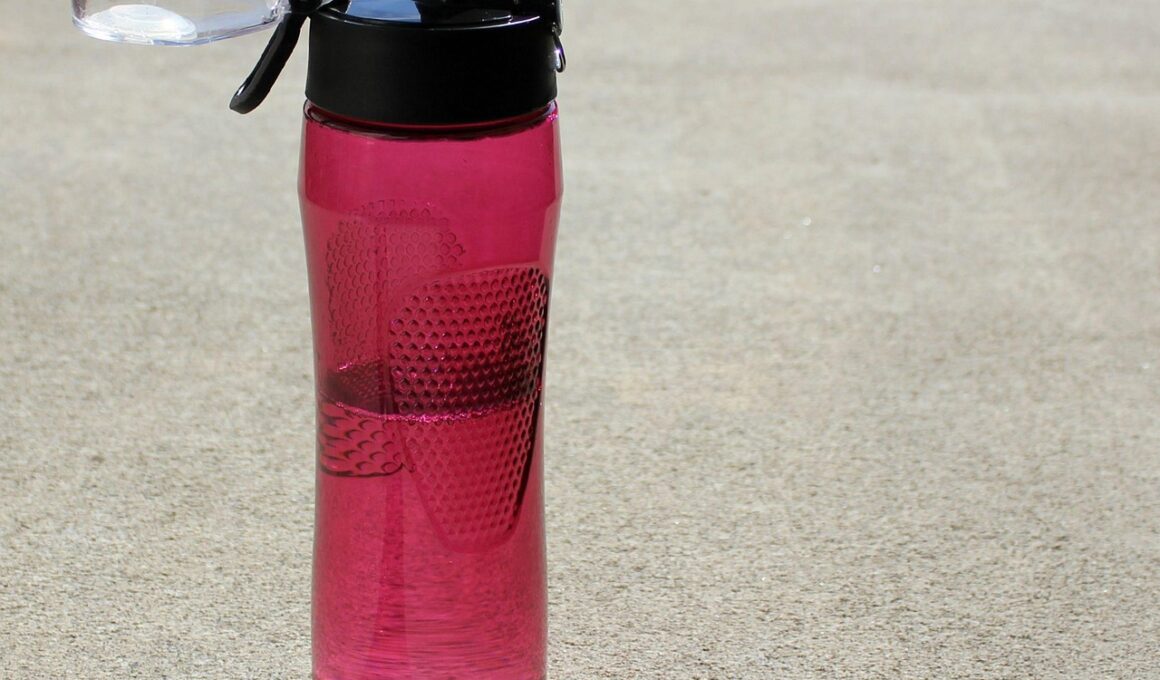Hydration Tips to Stay Safe During Cardio Workouts
Staying hydrated is crucial during any cardiovascular workout, and this importance amplifies in high-intensity exercises. The human body is composed of approximately 60% water, and this essential component aids in optimal bodily functions, including temperature regulation and joint lubrication. During cardio training, you lose fluids through sweat, and if not replaced, dehydration can occur, leading to fatigue or muscle cramps. To combat this, establish a hydration strategy before, during, and after your workout sessions. Start by drinking plenty of water throughout the day to maintain hydration levels, aiming for at least eight glasses. Furthermore, make it a point to drink about 16 ounces of water about two hours before your workout. Additionally, during your workout, sip on water every 15 to 20 minutes. After your workout, replenish lost fluids with water or a sports drink containing electrolytes. Be mindful of your body’s signals; thirsty feelings might indicate that you need to hydrate more than usual. A well-planned hydration strategy will enhance your endurance, performance, and recovery, thus keeping you safe while enjoying the benefits of cardio workouts.
Another critical aspect of hydration during cardio training is recognizing the signs of dehydration. Symptoms such as dizziness, excessive thirst, and headaches can signal your body needs more water. Monitoring your urine color can also provide insight into your hydration levels. Clear or light yellow urine generally indicates adequate hydration, while darker shades may indicate dehydration. If you notice such changes, make sure you adjust your fluid intake accordingly. Furthermore, the duration and intensity of your workout can also influence how much water you should be drinking. For longer sessions or higher intensity, consider electrolyte replenishing to maintain balance. Sports drinks can help in instances of intense training but be wary of added sugars. You want to stay energized but not overload your body. Always read labels and perhaps even prepare homemade electrolyte solutions using simple ingredients such as salt and sugar. Make it a habit to carry a water bottle with you, ensuring that hydration becomes a routine part of your workout. Lastly, listen to your body—if it’s asking for more water, don’t ignore those cues but adjust your drinking habits accordingly.
Hydration Before Cardio Training
Preparing for your cardio session requires more than just lacing up your sneakers; hydration is key to successful performance. Establish a pre-workout hydration routine that incorporates drinking water or electrolyte drinks. Ideally, you should aim to drink about 16 ounces of water two hours before your workout. If you’re working out in a particularly hot environment, consider increasing that amount. If your cardio session is scheduled for early morning, drink some water as soon as you wake up. Before heading out, ensure your body is fully hydrated—it will enhance your performance significantly. Additionally, you might want to consume a small snack enriched with water content, such as fruits like watermelon or orange, to provide extra hydration along with energy. Hydration not only prepares your body for the physical exertion of cardio but aids cognitive function as well, keeping your mind sharp and focused. Be aware of how caffeine and alcohol can negatively affect your hydration levels. If you’ve consumed either, compensate by drinking extra water to counteract their dehydrating effects, thus leading to an overall improved workout experience.
While in the middle of your cardio workout, maintaining hydration is vital to ensure you can sustain your energy and performance levels. Depending on your workout duration and intensity, the fluid lost through sweat can be significant. As a rule of thumb, drink about 7 to 10 ounces of fluid every 10 to 20 minutes during exercise. This can vary based on individual sweat rates and climate conditions. A strategy you could implement involves using a sports bottle that allows easy sipping throughout your routine. If you’re exercising for longer durations, such as over an hour, consider incorporating a sports drink that replenishes both fluids and electrolytes. It is especially useful for athletes engaging in high-intensity cardio, as it helps avoid fatigue and cramping. Pay attention to your body’s cues, as needing a drink is usually a sign you are moderately dehydrated. Taking the time during your workout to hydrate will ultimately prevent performance from tapering off while enhancing endurance. This is your body’s way of signaling a need to replenish fluids and ensures that you are meeting the hydration demands of your activity.
Rehydration After Cardio Training
Post-workout care is just as important as your pre and during cardio hydration efforts. After finishing your cardio training, it is essential to rehydrate thoroughly. Fluid losses must be replaced to help your digestive system function optimally, as well as promote recovery in the muscles. Aim to drink at least 16 to 24 ounces of fluid for every pound of body weight lost during exercise. This will help restore lost resources effectively, maintaining both your performance and health. If your workout lasted over an hour or was of high intensity, consider incorporating a beverage that contains electrolytes, as these are vital for muscle recovery. Many individuals find that fluids with electrolytes help them recover more effectively, promoting quicker recovery through rehydration. Always keep an eye out for signs of dehydration such as fatigue, dizziness, or uneven heart rates that may develop after workouts. Implement these strategies into your routine, and allow your body the necessary time to recover through proper hydration. This will ensure that you are ready for your next workout while maximising overall health and performance.
In addition to drinking water post-exercise, consider the significance of a balanced diet rich in fluids. Foods such as oranges, strawberries, cucumbers, and celery boast high water content, aiding further hydration without relying solely on fluids. Consuming these foods after a workout can not only help with hydration but also provide essential nutrients that support recovery. You can blend fruits into smoothies or prepare a salad incorporating both fruits and vegetables to add hydration. Remember that your body continues to lose fluids even after you stop exercising; therefore, make a habit of hydration throughout the day. Experiment with different hydration strategies to understand what works best for your body. Also, be wary of consuming drinks high in caffeine or alcohol immediately after exercise, as they can lead to further dehydration. Instead, center your post-workout hydration plan on water and electrolyte-based drinks rich in nutrients. Hydration should be a continuous effort, sustaining your recovery and preparing you for your next session without setbacks.
Overall Hydration Strategies for Cardio Routines
Establishing a comprehensive hydration routine during cardio training provides significant benefits. Track your fluid intake and ensure that you are consuming enough before, during, and after workouts to maintain optimal hydration levels. Invest in a reusable water bottle that you can carry throughout your day, promoting consistent hydration habits. With a visible reminder, it will be easier to monitor your intake and stay on track. Consider setting hydration alerts on your phone, reminding you when to drink, especially if you often forget while busy. Following your training sessions, practice post-hydration routines that bring attention to your body’s needs. Including small reminders can significantly improve your awareness of hydration. Also, adjust your hydration strategies based on the changing seasons and your training regimen. In warmer months, hydration needs typically increase, so it’s crucial to raise your intake accordingly. Make awareness and accessibility key strategies in your hydration plan, ensuring all necessary precautions are taken to prepare your body adequately for cardio workouts. This proactive approach can empower your body to perform competitively while maintaining the safety of both long and short cardio sessions.
Additionally, understand that your hydration needs can differ based on individual factors such as age, sex, and climate. Assess how these factors might affect your workout needs—young athletes may have different hydration requirements than older adults. Equally, extreme weather conditions may require more fluid intake. For example, working out in high humidity can cause excessive sweating, increasing the necessity of hydration. Tailor your hydration approach by recognizing how these variables impact your training. Furthermore, engage with certified trainers or nutritionists who can provide personalized insights into your hydration needs. They can assist you in creating a customized hydration schedule that reflects your unique training intensity and individual characteristics. Embracing sound hydration practices not only benefits your cardiovascular health but showcases a commitment to overall wellness. Keep in mind that hydration fuels recovery, which is equally crucial for maintaining stamina in subsequent training sessions. Ultimately, understanding these hydration principles contributes to achieving fitness goals and fosters a healthier lifestyle overall. Thereby, as you undertake cardio workouts, remember that commitment to effective hydration amplifies both safety and performance.


